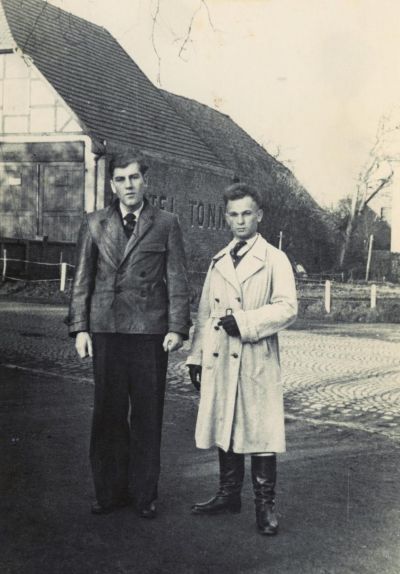The “Polish camp” in Lahde/Weser

The camp structure and organisation in the Lahde DPAC. Repatriation problems
On 9th May 1945 UNRRA Team 65 took over responsibility for administrating the DPAC in Lahde. According to British figures there were about 20,000 displaced persons here at the end of May 1945. According to German figures between 12,000 and 17,000 homeless foreigners were living in the Lahde DPAC until it was closed down. The leading posts in the UNRRA camp (i.e. the director and his deputy), were first held by British citizens. From around 1947 the post of the UNRRA director was held by a Polish national.
From 1945 the proportion of Polish displaced persons became increasingly dominant in the Lahde DPAC. Each DP camp had its own individual structure and its Mayor, community council and camp police. Weddings were held in the camps and children were born here. Displaced persons who died were laid to rest in local cemeteries. As far as running the camps was concerned, DP’s were also given the opportunity to work in the administrative quarters, the supply depot, in the education and health services, as craftsmen and unskilled workers. They were paid in German currency by the Lahde administration authorities under British control.
Lessons in Polish schools began in Cammer camp as early as May 1945. In July Polish schools were opened in the camps at Bierde, Frille, Ilserheide, Lahde, Raderhorst and Wietersheim. Polish teachers were on the UNRRA payroll.
The medical care of displaced persons – including dental care – was ensured by setting up DP hospitals in Lahde, Frille and Bad Hopfenberg. The Lahde Protestant church was also used by Catholic priests from the DP church community. Following an agreement between the Western Allies and Russia, repatriation of Russian DPs from the western occupied zones began in May 1945. This was for the most part completed by the following September.
But allied plans to repatriate Polish DPs immediately failed to materialise. Infrastructures in Poland had been severely damaged by the invading German forces in 1939 and the battles during their retreat at the end of the war. The shift of Polish borders westwards also meant that original parts of Poland ceased to exist and some Polish DPs were made stateless persons. The Russian occupation of Poland led to the introduction of a Communist regime. Such a perspective meant that the mass of Polish – and also Baltic – misplaced persons refused to be repatriated, and preferred to be sent to other countries abroad. The headquarters in the British occupied zone accepted their decisions, the upshot of which was that the management of the DPACs continued for some time longer.






